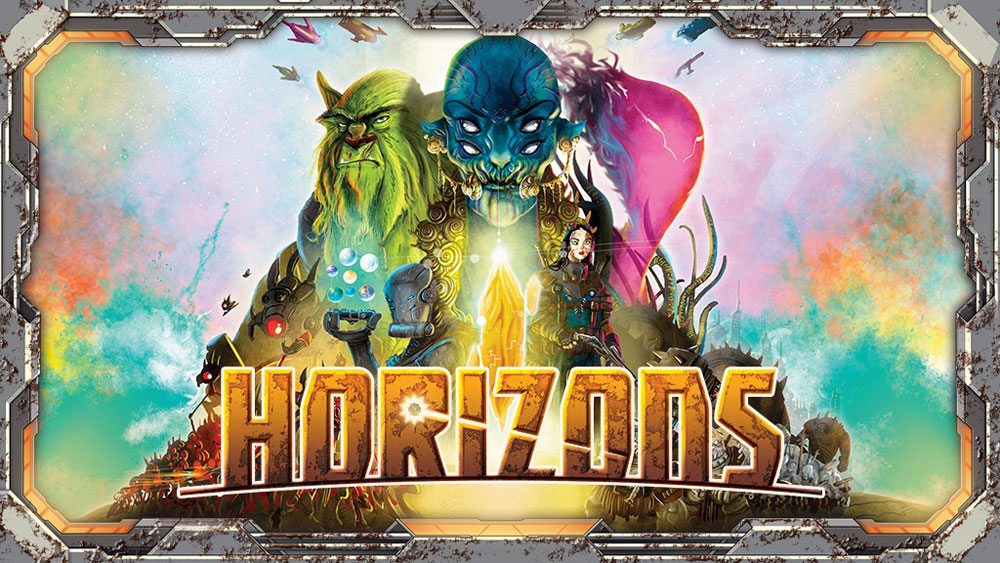It’s time to head to the stars! Discover new planets, adapt to their habitats, and build new colonies. Meet alien civilizations and recruit them as allies. Who will be the best at expanding their Horizons?
What Is Horizons?
Horizons is a “4X-style” game from Daily Magic Games for 2 to 5 players, ages 14 and up, and takes 60–75 minutes to play. It’s currently on Kickstarter, with a pledge level of $39 for a copy of the game (or $10 for the premium Print and Play). The game is a mix of resource management, exploration, and secret missions, and I think would be fine for younger players if they’re relatively experienced; there isn’t anything inappropriate thematically for younger players.
New to Kickstarter? Check out our crowdfunding primer, and visit our Kickstarter curated page for more projects we love.
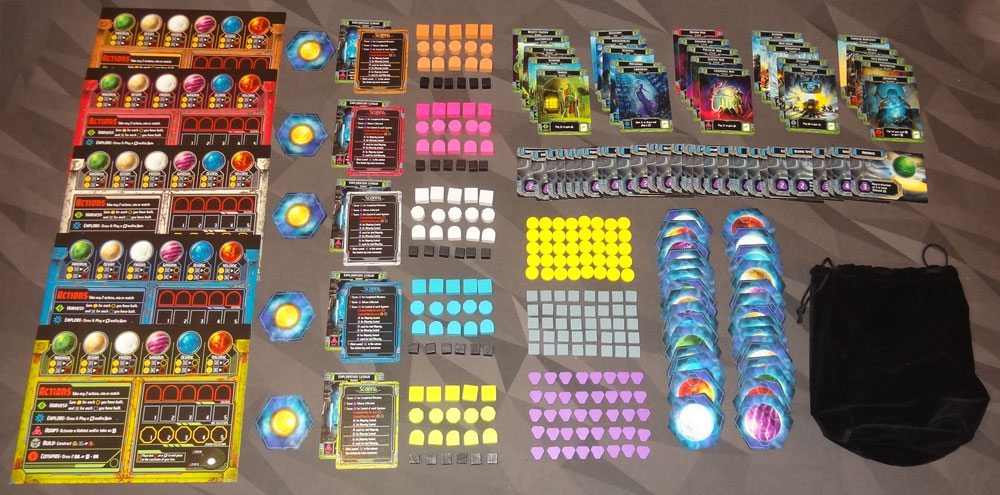
Horizons Components
My review is based on a prototype, so component quality and artwork is not final. Be sure to look at the Kickstarter page for the most up-to-date information, including stretch goals. For instance, the Habitat markers in the prototype are wooden cubes, but in the final version will be planet hemispheres that attach to the player boards.
- 5 player boards
- 5 Exploration League Ally cards
- 5 Player Aid cards
- 25 Metal Collector tokens (5 each per player color)
- 25 Energy Collector tokens (5 each per player color)
- 25 Colony tokens (5 each per player color)
- 30 Habitat markers (a set of 6 per player)
- 5 Star tiles
- 1 cloth bag
- 30 double-sided World tiles
- 25 double-sided Alien Ally cards
- 30 Mission cards
- 40 Metal tokens
- 40 Energy tokens
- 40 Knowledge tokens
Even though there are a lot of components, the game is actually not too difficult to parse once you look at everything. Your metal collectors are squares (in your player color), reflecting the square shape of the metal resource tokens. Each of the five available actions has an icon (and color) shown on your player board, and these same icons are used on the ally cards as well. There are clearly marked spots on the player boards for the three types of structures you can build.

The illustrations for the game are done by The Mico, a frequent collaborator with Daily Magic Games and the artist behind the Valeria series. If you’ve enjoyed all of his fantasy artwork in those games, you’ll really dig his take on sci-fi worlds, too.
My only concern about the components at least in this prototype form is that the text on the Ally cards is fairly small and uses a squarish font that can be a bit hard to read. I’m hoping that the text will be made a little easier on the eyes in the final version.
How to Play Horizons
The rulebook is available for download here, and you can also try it out on Tabletop Simulator.
The Goal
To win, you must score the most points by the end of the game by gaining knowledge, completing missions, and having majority control in each star system.
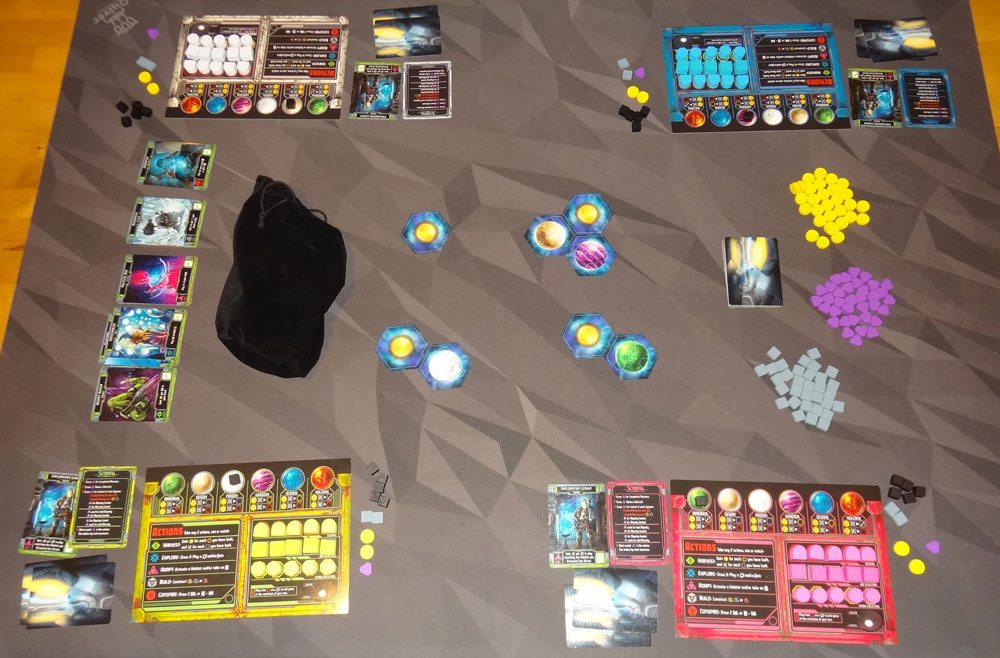
Setup
To set up the game, place 1 star tile per player in the center of the play area—note that the star systems do not belong to specific players, but the player count determines how many are available. Separate the Ally cards into the five different stacks corresponding to the 5 different actions, and shuffle each stack individually. Shuffle the Mission cards. Put all the world tiles into the bag.
Give each player: a player board, 5 energy collectors, 5 metal collectors, 5 colonies, 6 habitat markers, an Exploration League Ally card, a player aid card, 2 random Mission cards from the deck, 2 metal tokens, 2 energy tokens, and 1 knowledge token. Choose a starting player. In turn order, each player will draw a world tile from the bag, choose which side to place face-up connected to any of the star tiles, and then activate the corresponding habitat on their player board using the habitat marker—the habitat markers indicate which worlds you have adapted to and are able to build on.
Note: the star systems should be spaced out so that they are totally separate because they will never connect to each other. Each star tile may have up to six world tiles attached to it.
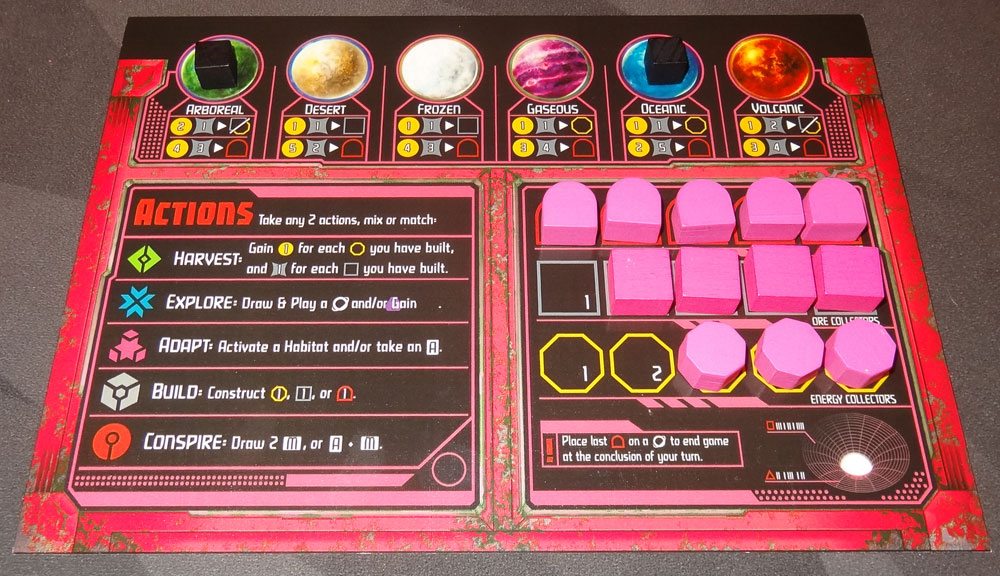
Actions
After set up, each player takes turns going clockwise. You get 2 actions on your turn, which may both be spent on the same choice:
- Explore: Draw a world tile from the bag and place it next to a star. Gain 1 knowledge.
- Adapt: Activate a habitat and/or take the top Ally from any stack.
- Build: Build a collector or colony.
- Harvest: Gain 1 resource per collector you have built.
- Conspire: Draw 2 mission cards or 1 ally and 1 mission card.
A note about building: you may only build on worlds that you’ve adapted to (as marked on your player board), and you may only build the types of structures listed there. For instance, you can build any of the three structures on an Arboreal world, but you can’t build energy collectors on a Desert world or metal collectors on a Gaseous world. Every world can support colonies. The costs of building collectors and colonies varies from world to world.
The player board shows how many of each type of collector you’ve built so that it’s easy to know how much you harvest on your turn. In the photo above, the pink player would harvest 1 metal and 2 energy.
You have a hand limit of 5 Allies and 5 Mission at the end of your turn—if you have more than that, you’ll have to discard down, with Allies returning to the bottom of the appropriate stack.
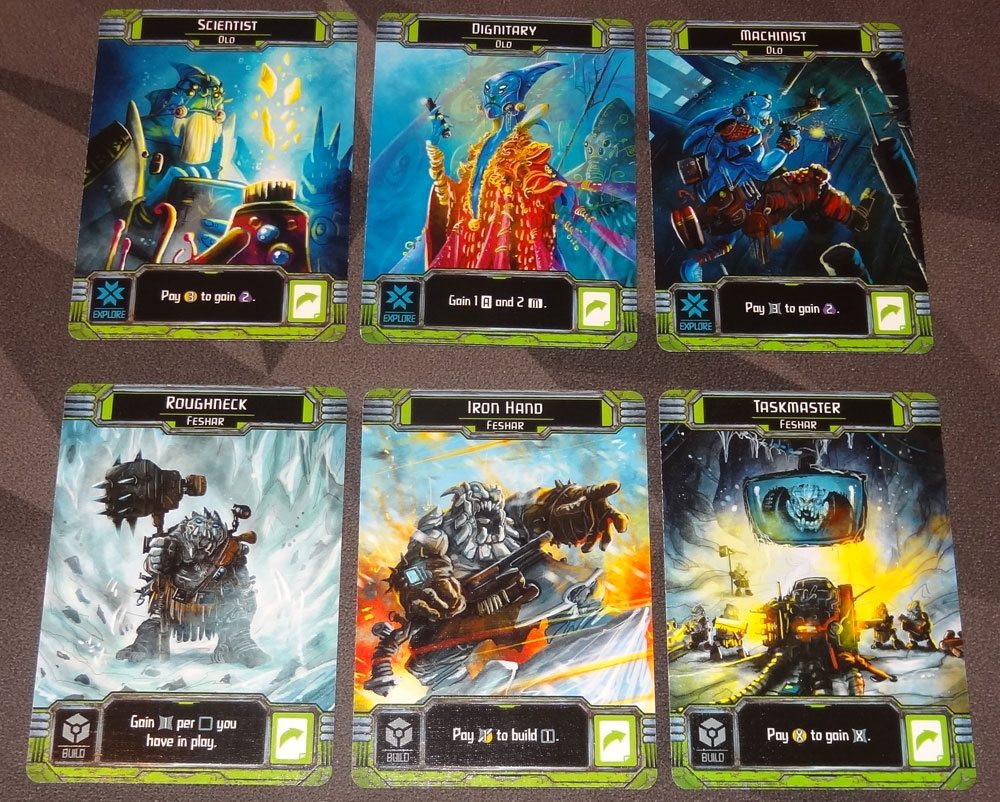
(Prototype shown) Photo: Jonathan H. Liu
Allies
Each of the ally stacks represents an alien race, and each race has expertise in a particular type of action. Every time you take an action, you may activate one ally with a matching action. The ally power may be used before, during, or after your corresponding action. The ally cards are double-sided, green on one side (with a “flip” arrow icon at the bottom) and red on the other (with either a “trash” or “X” icon at the bottom). The first time you use an ally, you flip it over to the red side. The next time you use an ally, you trash it (remove from game) or return it to the bottom of the stack, according to the icon.
Game End
The game ends immediately when any player places their last colony, even if it was their first action of the turn.
At the end of the game, there are three things you score points for: knowledge tokens, mission cards, and system control.
Knowledge tokens are worth 1 point apiece.

Mission cards are kept secret during the game, and you may have up to 5 of them. If you meet the requirements listed on the card, then you get the points indicated. Some are based on habitat types—having structures on several of the same type of planet, or having a star system that includes at least 3 of the same habitat. Some are based on the number of resources you have left, or whether you share planets with other players.

System Control gives points to the players with the most control in each star system. Evaluate each star system separately. Colonies are worth 2 control, and collectors are worth 1 control. The player with the majority gets 6 points, and the player with the second most control gets 3 points. In the case of a tie for first, the tied players get 3 points each, and nobody else scores. If there’s one player with the most but a tie for second most, the tied players get 1 point each.
The player with the most total points wins, with ties broken by the player with the most resources left, and then by the player with the most points from mission cards.
Why You Should Play Horizons
First, a disclosure: Levi Mote, the designer of Horizons, is a friend of mine; we met several years ago at GameStorm (a local game convention) when he was running demos of Ruse. Since then, I’ve gotten to know him better as he worked on various game designs and joined the Daily Magic team, and I’ve gotten to play several of his games in prototype form.
Horizons has been in development for a few years now, and I’ve played a few iterations of it. In the last few times, the gameplay was mostly nailed down, with the Daily Magic team running lots of playtests to tweak and balance the various costs and card effects. I’m always impressed with the notes that they take during these playtests, tracking how players scored, where their scores came from, and so on. It’s no wonder to me that the Valeria series has done so well, and I know that the same sort of attention to detail has been put into Horizons.
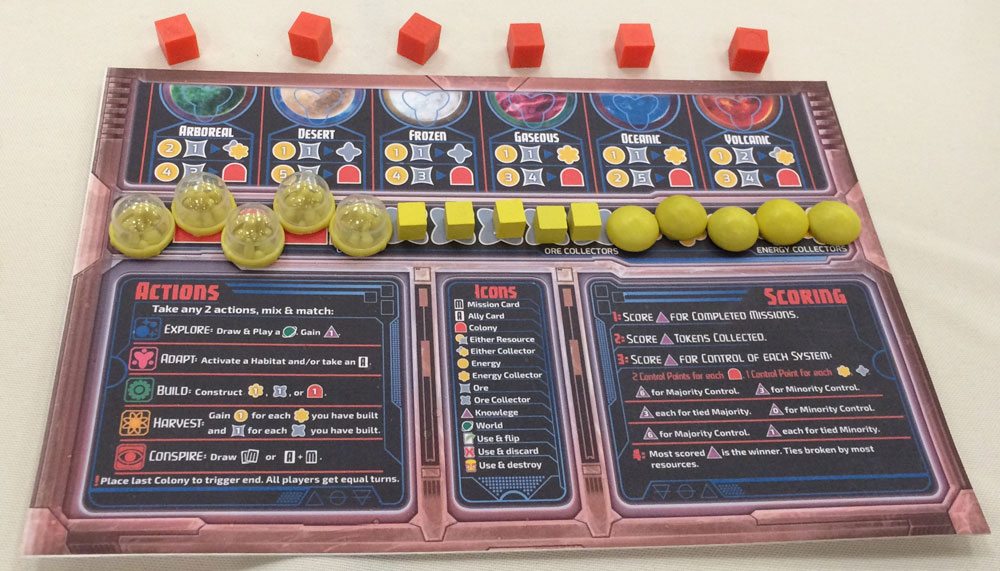
(Prototype shown) Photo: Jonathan H. Liu
Daily Magic Games has been launching and delivering Kickstarter projects in rotation for a few years now, and although there have occasionally been delays (as there are in many campaigns), I think they have a proven track record for getting a high-quality game delivered to backers, and you can back this project with confidence.
But what about the gameplay?
Levi stated that his motivation behind Horizons was to capture the feel of a 4X game in a game that didn’t take hours to play. Horizons lets you explore (draw and place new tiles), expand (build collectors and colonies), and exploit (harvest resources with your collectors) in a game that plays in about an hour. I’m not sure which “X” the alien allies and missions falls under, but perhaps a combination of expand and exploit. Of course, you’ll note that there’s one “X” that isn’t present: exterminate. Horizons is an area-control game, but that area control is done more through resource management and as a race, rather than through combat—once placed, a structure will remain until the end of the game. So it’s really more of a 3X game, and has a bit of a feel of a Euro-style game.
I should note that one of the stretch goals already listed is for an alternate species ally card that will add the optional “Exterminate” gameplay, so that would make it truly a 4X game. I haven’t played with those cards, though, so I’m unable to comment on how those work.
Within the 3X, though, you do get different paths to victory. Each time you explore, you get knowledge tokens, which are worth points in themselves, or can be spent with certain ally cards for powerful effects. Expanding is crucial—building collectors is how you get resources, and you have to watch that other players don’t run away with the majority in too many star systems. But you also shouldn’t underestimate exploiting—the mission cards can be a valuable source of points, especially if you can find missions that align with what you’re already doing. I think in this particular game, it can be hard to win without some amount of expansion, but the amount that you spend exploring and exploiting can vary according to your tastes.
The game itself is not too difficult to learn; the prototype rulebook is one of the shorter ones I’ve seen for a game of this weight, and I was pleased to be able to teach it quickly and dive into the game without too much rules explanation.
Overall, I think Horizons is an excellent medium-weight 4X(ish) game that will appeal to Euro-style fans and sci-fi fans alike. If you enjoy space-exploration games, alien races, and area control, take a look at the Horizons Kickstarter campaign!
Click here to see all our tabletop game reviews.
Disclosure: GeekDad received a prototype copy of this game for review purposes.
